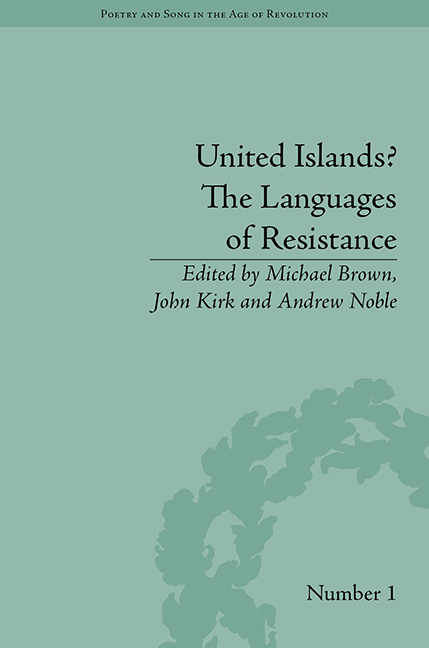Book contents
- Frontmatter
- CONTENTS
- Acknowledgements
- List of Figures and Tables
- List of Contributors
- Introduction: The Languages of Resistance: National Particularities, Universal Aspirations
- 1 Reading the English Political Songs of the 1790s
- 2 Why should the Landlords have the Best Songs? Thomas Spence and the Subversion of Popular Song
- 3 ‘Bard of Liberty’: Iolo Morganwg, Wales and Radical Song
- 4 Canonicity and Radical Evangelicalism: The Case of Thomas Kelly
- 5 Charlotte Brooke's Reliques of Irish Poetry: Eighteenth-Century ‘Irish Song’ and the Politics of Remediation
- 6 Homology, Analogy and the Perception of Irish Radicalism
- 7 Lost Manuscripts and Reactionary Rustling: Was there a Radical Scottish Gaelic Poetry between 1770 and 1820?
- 8 Virile Vernaculars: Radical Sexuality as Social Subversion in Irish Chapbook Verse, 1780–1820
- 9 Thomas Moore and the Problem of Colonial Masculinity in Irish Romanticism
- 10 Radical Politics and Dialect in the British Archipelago
- 11 ‘Theaw Kon Ekspect No Mooar Eawt ov a Pig thin a Grunt’: Searching for the Radical Dialect Voice in Industrial Lancashire and the West Riding, 1798–1819
- Afterword: The Languages of Resistance
- Notes
- Works Cited
- Index
5 - Charlotte Brooke's Reliques of Irish Poetry: Eighteenth-Century ‘Irish Song’ and the Politics of Remediation
- Frontmatter
- CONTENTS
- Acknowledgements
- List of Figures and Tables
- List of Contributors
- Introduction: The Languages of Resistance: National Particularities, Universal Aspirations
- 1 Reading the English Political Songs of the 1790s
- 2 Why should the Landlords have the Best Songs? Thomas Spence and the Subversion of Popular Song
- 3 ‘Bard of Liberty’: Iolo Morganwg, Wales and Radical Song
- 4 Canonicity and Radical Evangelicalism: The Case of Thomas Kelly
- 5 Charlotte Brooke's Reliques of Irish Poetry: Eighteenth-Century ‘Irish Song’ and the Politics of Remediation
- 6 Homology, Analogy and the Perception of Irish Radicalism
- 7 Lost Manuscripts and Reactionary Rustling: Was there a Radical Scottish Gaelic Poetry between 1770 and 1820?
- 8 Virile Vernaculars: Radical Sexuality as Social Subversion in Irish Chapbook Verse, 1780–1820
- 9 Thomas Moore and the Problem of Colonial Masculinity in Irish Romanticism
- 10 Radical Politics and Dialect in the British Archipelago
- 11 ‘Theaw Kon Ekspect No Mooar Eawt ov a Pig thin a Grunt’: Searching for the Radical Dialect Voice in Industrial Lancashire and the West Riding, 1798–1819
- Afterword: The Languages of Resistance
- Notes
- Works Cited
- Index
Summary
Charlotte Brooke's Reliques of Irish Poetry (1789) has long been recognized as the first printed collection of Gaelic poetry translated into English. In Mere Irish and Fíor-Ghael: Studies in the Idea of Irish Nationality, Its Development and Literary Expression Prior to the Nineteenth Century, Joep Leerson calls her ‘the first mediator of importance between the Irish-Gaelic and the Anglo-Irish literary traditions’. Critical discussion of the Reliques has centred exclusively on the work's poetry, however, ignoring Brooke's interventions in another medium of Irish-Gaelic culture: music. In fact, Brooke's first published work was a translation of a song by Turlough Carolan that she supplied to Joseph Cooper Walker for his Historical Memoirs of the Irish Bards (1786). Brooke included this and other songs in her Reliques of Irish Poetry, along with an extensive commentary entitled ‘Thoughts on Irish Song’. This essay examines how the Reliques negotiates with perceptions of ‘Irish song’ that appeared in popular and antiquarian discourses in late eighteenth-century British and Irish venues. It will suggest that Brooke's reconfiguration of the lyrical productions of her nation offered a new perspective on the subject of ‘Irish song’ to contemporary readers, while, at the same time, constituting an important comment on the media culture of the eighteenth century. For unlike contemporary works supposedly representing ‘Irish song’, Brooke registered what I will identify as a marked ambivalence to the attempt to ‘remediate’ Gaelic musical culture through the technology of print.
The use of the term ‘media’ in an eighteenth-century context is a matter of some contention. On one extreme, Jay Bolter and Richard Grusin trace continuities in the ideas of media ‘throughout the last several hundred years’. Wendy Hui Kyong Chun and Thomas Keenan, however, counter that an investigation of the history of media must ‘grapple with the ways that mediums have changed, rather than concentrating on the remarkable yet overdetermined similarities between entities now considered media’.
- Type
- Chapter
- Information
- United Islands?The Languages of Resistance, pp. 95 - 108Publisher: Pickering & ChattoFirst published in: 2014

